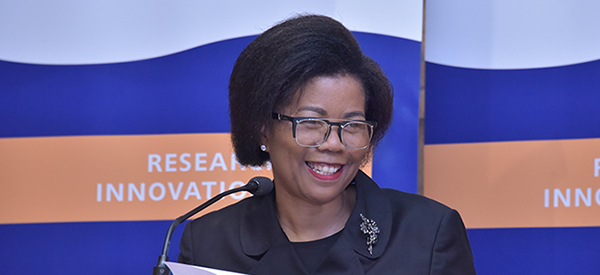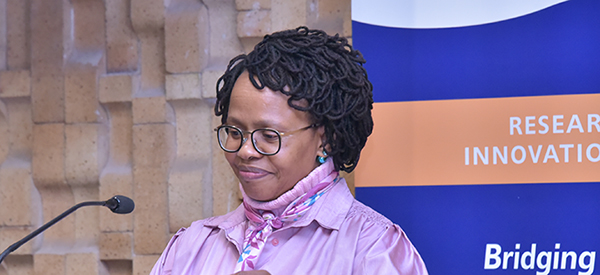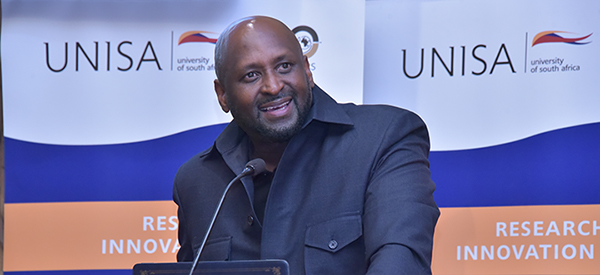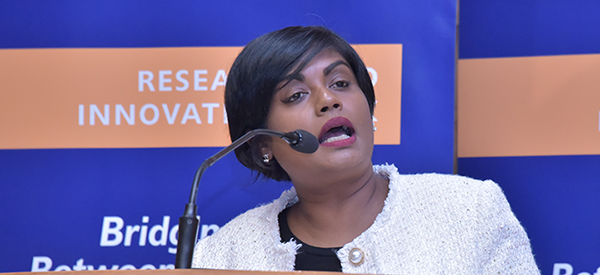
Taking place from 20 to 24 May 2024, Unisa’s much-anticipated annual Research and Innovation Week reflects on the theme Bridging the gap between science and society: Fostering research and innovation for societal impact.
The opening session on 20 May set the tone for presentations and discussions on the transformative potential of research and innovation in addressing the pressing challenges facing the global community.
In her opening address, Prof Puleng LenkaBula, Unisa Principal and Vice-Chancellor (VC), expressed her pride in the investment that the university is making in research and innovation. She also congratulated the university and its academics for the improved position of Unisa within the world rankings, the growth in the number of NRF-rated researchers, and the number of staff members holding PhD qualifications. "We have moved from 39% of academics holding PhDs to 62% this year," she said. "We are aiming for 80% by the end of next year."

Prof Puleng LenkaBula, Unisa Principal and Vice-Chancellor
Continuing, the VC stated that socioeconomic and geopolitical temperatures in general appear to be rising along with global warming and other factors that add fuel to the fire. She touched upon the polarisation of the world due to wars and other global contestations, and the challenges posed by ecological degradation. "It is quite important for us, especially in Africa, to ask what the real substantive concerns are around ecological degradation, especially concerning ecological debt and the way in which it is distributed."
The VC said that globally, there is an increase in misinformation, especially on social media. "This is exacerbated by the advent of the deep-fake phenomenon generated by technologies such as artificial intelligence," she continued. "In this volatile and uncertain climate, who can the public trust? To whom can the person in the street turn for reliable, verifiable and accurate facts and figures? All indications are that the scientific community continues to rank highly as a trusted, reliable source of data and information analysis."
The VC warned against universities becoming distant from communities and being viewed as inaccessible to most. "I think," she said, "that this is quite an important area for us in which to mediate through accessible scholarship, ensuring that the community understands who we are."
"The issue of science cannot be treated in isolation from the socioeconomic question," said the VC in conclusion. "I wish you all the best in your deliberations this week, and I am hoping that all the papers that will be presented here will find their way to publications here at home or abroad."
Placing the Research and Innovation Week in context, Prof Thenjiwe Meyiwa, Vice-Principal: Research, Postgraduate Studies, Innovation and Commercialisation at Unisa, said that the week stands as a beacon of hope, illuminating the path towards the future. "The bounds between science and society are blurring," she said, "and research and innovation have become synonymous with progress and prosperity."

Prof Thenjiwe Meyiwa, Vice-Principal: Research, Postgraduate Studies, Innovation and Commercialisation at Unisa
Meyiwa stated that it is imperative to recognise the pivotal role that research and innovation play in shaping our collective destiny. "During this week we will bear witness to a myriad of presentations, each offering a unique perspective of the intersection of science and society," she said.
In conclusion, she stressed that the pursuit of research and innovation is not merely an academic exercise. "It is a moral imperative, a sacred trust, bestowed upon us by future generations. Together, let us bridge minds, bridge gaps and build a brighter tomorrow for all."
The keynote address was delivered by Prof Tennyson Mgutshini, Executive Dean of Unisa’s College of Graduate Studies, who spoke on Optimising Unisa’s catalytic niche areas – from theory to praxis.
"It is important," he said, "that we consider some of the issues around moving from the theoretical space where we talk about the concepts to how we actually make these catalytic niche areas a reality for the world in which we operate. I want to challenge our academic community to look at the practical possibilities of the niche areas."

Keynote speaker Prof Tennyson Mgutshini, Executive Dean of Unisa’s College of Graduate Studies
Mgutshini said that the university intentionally identified ten catalytic niche areas and proceeded to provide a meticulous outline of how the university arrived at these areas, which are:
Following this, Mgutshini discussed the modalities for implementing these niche areas within Unisa, paying particular attention to curricular integration and the development of formal qualifications, and optimisation by maximising multi-, inter- and transdisciplinary opportunities in research development.
Moving to praxis, he cited a number of practical examples of specific initiatives at Unisa linked to these niche areas, and discussed a framework for catalytic niche area optimisation within postgraduate contexts.
In conclusion, Mgutshini discussed the operational challenges related to moving from theory to praxis, including limited conceptual orientation, limited coherence in research planning, varied cross-disciplinary competence, lack of consistency in recording optimisation efforts, and paradigm shift acceptance restrictions. A lively question-and-answer session followed, with the VC also weighing in on some of the issues raised by audience members.

Programme director, Dr Geneviève James, Deputy Director: Community Engagement and Outreach at Unisa
The remainder of the week will feature a series of engaging college events, at which participants will delve into the dynamic intersection of academia, industry, and society, fostering collaboration and driving meaningful change for a better tomorrow.
Click here for the week's programme.
* By Philip van der Merwe, Editor, Department of Institutional Advancement
Publish date: 2024/05/22